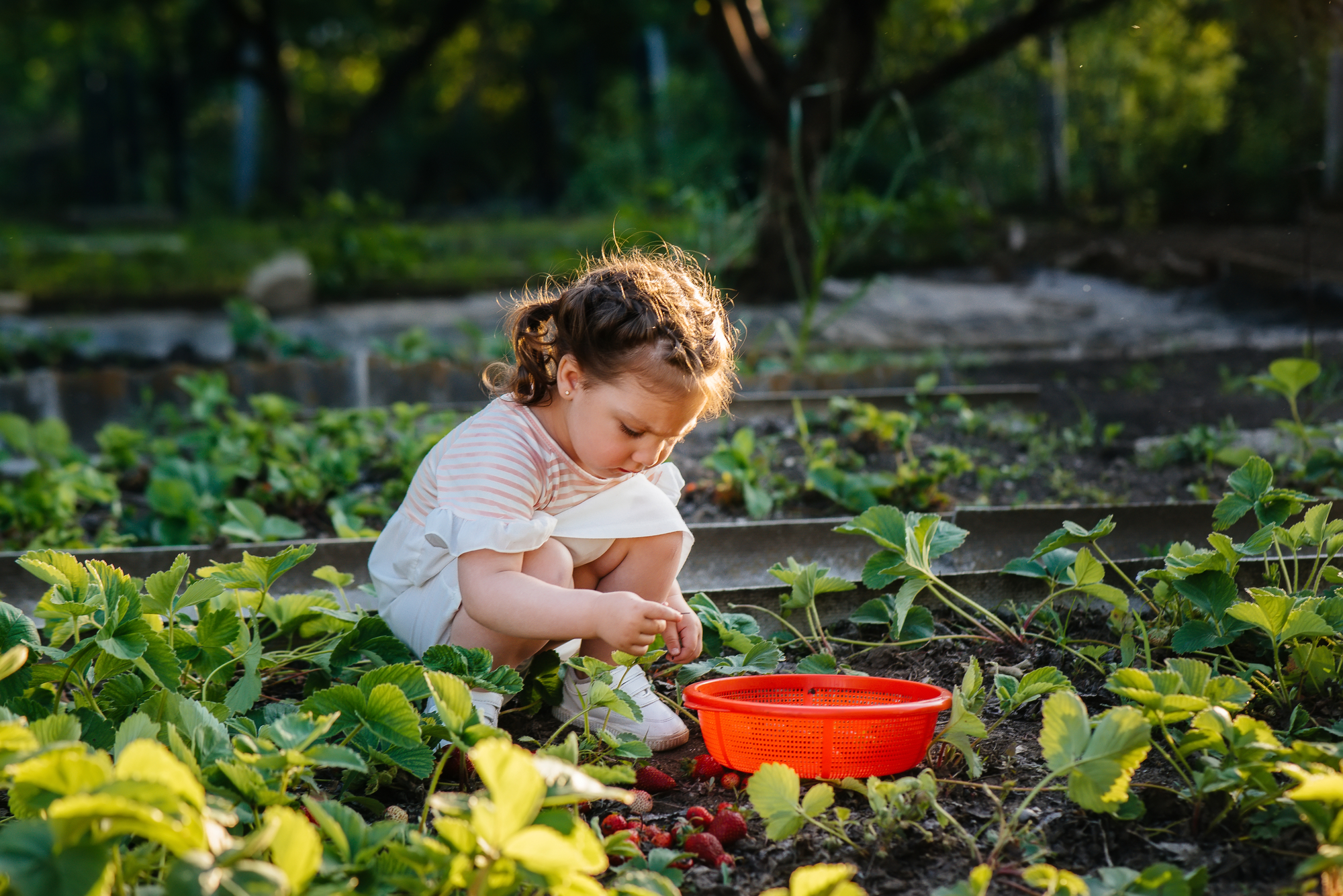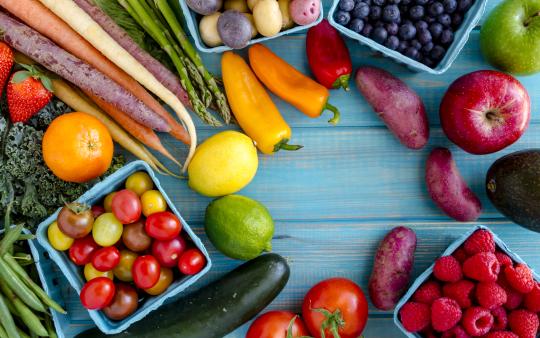Imagine a home filled with laughter, energy, and a sense of well-being. By incorporating holistic nutrition and lifestyle practices, you can create a vibrant and thriving household where everyone flourishes. This guide explores tips to help you foster a holistic approach that nourishes your family’s body, mind, and spirit. Here are 30 practical holistic nutrition and lifestyle tips for your healthy family to celebrate the Canadian School of Natural Nutrition’s 30th anniversary. Over the past 30 years, CSNN has empowered families with science-based holistic health knowledge by training holistic nutrition practitioners and educating communities, fostering generations of well-being.
Fuel Your Family’s Bodies
1. Embrace Rainbow Power: Each color boasts a unique blend of nutrients. Eating a rainbow of fruits and vegetables is linked with health (lower inflammation, cardiovascular disease, diabetes, cancer, body weight), as shown in studies of over 37 million people.
2. Go Whole Grain: Whole grains have more vitamins, minerals, phytonutrients, and fibre. Talk to your family about how fibre keeps you feeling fuller for longer, aids digestion, and helps regulate blood sugar levels. A study at a school canteen even found students preferred whole grain muffins more when they knew it was healthy.
3. Get Friendly with Fats: Include healthy fats like nuts, seeds, avocados and olive oil in your diet. Many families avoid fats, replacing them with refined carbohydrates—research shows this does not benefit heart health. Fats are essential for hormone production and nutrient absorption. Plus, studies show brain function improves by eating more omega-3 fats.

4. Hydrate for Life: Make water your family go-to drink. Invest in reusable water bottles and make it fun by infusing water with fruits, herbs, or vegetables. Up to 71 percent of adults don’t drink enough water—a habit that increases risk of chronic diseases.
5. Limit Added Sugars: Canadian researchers found that families who ate ultra-processed foods ate more sugar (parents too)! Growing evidence highlights the negative impacts of eating too much added-sugar, such as dental, brain, and metabolic problems. But there’s no evidence added-sugar needs to be completely eliminated—just enjoy in moderation!
Move Together: Tips for an Active, Healthy Family
6. Make Time to Move Together: Get moving! Doing regular physical activity together improves your family’s physical well-being and boosts moods. Studies also show family time influences children’s physical activity.
7. Go on Family Fitness Adventures: Think beyond the gym-style workout. Explore active outings together. Plan a family bike ride, hike a new trail, or have a dance party in the living room.
8. Incorporate Movement Breaks: Combat screen time by incorporating movement breaks throughout the day. Do jumping jacks during commercial breaks, have a family yoga session after dinner, or stretch together before bed.

9. Fuel for Exercise: Plan healthy snacks to help replenish energy during your family hike, and to eat after for muscle recovery. Homemade energy balls, nut bars, trail mix, fruit, yogurt with berries, or a smoothie are all excellent options.
10. Schedule Family Fun Nights: Plan regular family fun nights focused on activities that don't involve screens. This could be playing soccer at the park, going mini-putting, or building an epic fort.
Empower Your Family's Mind and Spirit
11. Practice Gratitude: Expressing gratitude as a family and fostering positive emotions increases self-esteem and optimism. Share something you’re grateful for during meals together. Start a gratitude journal: Studies show that writing for a few days (and for as little as 15 minutes) can benefit mood, lowering anxiety and depression.
12. Embrace Mindfulness: Introduce mindfulness practices like meditation or deep breathing exercises. Research shows a mindful family has kids with lower anxiety and depression, and happier partners too.
13. Connect with Nature: Spend time outdoors as a family. According to research, immersing yourselves in nature reduces stress and blood pressure, and improves mood and sleep.

14. Embrace Unstructured Play: Allow for unstructured playtime, and join in! This promotes creativity, problem-solving skills, and social development in children.
15. Practice Mindful Eating: Encourage mindful eating habits at the dinner table. Turn off distractions, focus on the flavours and textures of food, and chew slowly to promote satiety.
Cultivate a Healthy Family Environment
16. Power Down for Sleep: Establish healthy sleep habits for everyone in the family. Adequate sleep is essential for mood regulation, positive social interactions, cognitive function and physical health. Be physically active during the day. Power off electronics early. Create calming, dark sleep spaces.
17. Grow Herbs Indoors: Create a mini herb garden indoors. This is a fun learning experience for children and allows easy access to fresh herbs for adding flavour to meals naturally.

18. Start a Vegetable Garden: Even a small garden on a balcony is a fun, educational activity that promotes healthy eating habits. Gardening is linked to better mental health and well-being in adolescents.
19. Limit Screen Time: Establish screen time limits for the whole family. This encourages other activities, fosters connection, and improves sleep quality. Excessive screen time reduces quality interactions, impacts language development, and impacts ability to focus.
20. Express Affection Freely: Show your family you love them through words of affirmation and physical touch. Hugs are scientifically proven to lower stress hormones.
Holistic Kitchen Tips for a Healthy Family
21. Make Mealtime a Family Affair: Sit down together for meals whenever possible. This creates opportunities for connection, conversation, and modeling healthy eating habits.
22. Cook Together: Involve children in age-appropriate meal preparation to foster healthy eating habits. Kids (ages 9-12) who take part in cooking at home eat more fruits and vegetables, shows research. Plus, it gives kids a sense of ownership while teaching valuable life skills.

23. Read Food Labels Together: Make grocery shopping a learning experience. Teach your children how to read food labels, identify healthy ingredients, and understand serving sizes.
24. Plan Your Meals: Plan your meals and snacks for the week to reduce stress and overcome barriers preventing your family from healthy eating. Meal planning also helps avoid unhealthy impulse buys.
25. Pack Powerful Lunches: Involve kids in packing their lunches. This empowers them to make healthy choices and reduces reliance on processed snacks.
Lifestyle Tips for a Healthy Family
26. Practice Forgiveness: Mistakes happen. Teach your children the importance of forgiveness, both for themselves and others. Forgiveness promotes emotional well-being and reduces stress.
27. Detox Your Home Environment: Add plants to your home to help improve air quality. Minimize exposure to environmental toxins by choosing natural cleaning products and avoiding artificial fragrances.
28. Volunteer Together: Give back to your community as a family. Volunteering fosters social connection, purpose, and a sense of gratitude.

29. Acknowledge Big and Small: Celebrate healthy choices your family makes, big or small: trying a new vegetable, a family fitness adventure, or a new healthy lunch idea. Positivity encourages healthy habits to stick.
30. Celebrate Your Journey: Embrace the journey of healthy living! Don't get discouraged by setbacks. Celebrate improvements in energy levels, mood, or strength (instead of body weight or shape). A positive attitude goes a long way in making sustainable healthy lifestyle changes.
Remember, a healthy family is a happy family. By incorporating these tips into your daily routine, you'll be well on your way to fostering a vibrant, thriving household that nourishes not just bodies, but minds and spirits as well.
This is just your starting point—The Canadian School of Natural Nutrition offers a wealth of knowledge to empower your family’s holistic health journey. Whether you’re looking to improve your and your family’s health or pursue a career in holistic nutrition, CSNN can help you achieve your goals. Explore their comprehensive Natural Nutrition Program and various workshops, including the Healthy Eating & Lifestyle Certificate and Holistic Culinary Certificate workshops.
Congratulations to CSNN for 30 years of making a difference!
References:
Should We ‘Eat a Rainbow’? An Umbrella Review of the Health Effects of Colorful Bioactive Pigments in Fruits and Vegetables. Molecules 2022 Jul; 27(13): 4061.
Health effects of whole grains: a bibliometric analysis. Foods 2022 Dec; 11(24): 4094.
Whole grain muffin acceptance by young adults. Foods 2018 June 13;7(6):91.
A healthy approach to dietary fats: understanding the science and taking action to reduce consumer confusion. Nutr J 2017; 16: 53.
Impact of dietary fats on brain function. Curr Neuropharmacol 2018 Aug 16(7): 1059-1085.
n-3 LCPUFA improves cognition: the young, the old and the sick. Prostaglandins Leukot Essent Fatty Acids 2014 Jul-Aug;91(1-2):1-20.
Water Intake, Water Balance, and the Elusive Daily Water Requirement. Nutrients 2018 Dec; 10(12): 1928.
The degree of food processing contributes to sugar intakes in families with preschool-aged children. Clinical Nutrition 2024 Feb; 59:37-47.
The impact of free sugar on human health – a narrative review. Nutrients 2023 Feb; 15(4): 889.
The role of family time together in meeting the recommendation for physical activity among primary school children. Int J Environ Res Public Health 2020; 17(11): 3970.
Development of a consensus statement on the role of the family in the physical activity, sedentary, and sleep behaviours of children and youth. Int J Behav Nutr Phys Activ 2020; 17(74).
A brief gratitude writing intervention decreased stress and negative affect during the COVID-19 pandemic. J Happiness Stud 2022; 23(6): 2427-2448.
The mindful family: a systemic approach to mindfulness, relational functioning, somatic and mental health. Curr Opin Psychol 2019 Aug;28: 138-142.
Associations between nature exposure and health: a review of the evidence. Int J Environ Res Public Health 2021 May; 18(9): 4790.
Effects of excessive screen time on child development: an updated review and strategies for management. Cureus 2023 Jun; 15(6): e40608.
Home gardening and the health and well-being of adolescents. Health Promo Prac 2016 Oct; 18(1).
Hugs and cortisol awakening response the next day: an ecological momentary assessment study. Int J Environ Res Public Health 2023 Apr; 20(7): 5340.
Cooking at home: correlates of frequency and intention in fifth graders. Health Edu Behav 2023 Jun; 51:2.
Meal planning as a strategy to support healthy eating. Nutrition Science en evolution 2020; 17(3): 12-16.

The Canadian School of Natural Nutrition has been Teaching the Medicine of the Future™ since 1994. Their commitment to quality education has made them Canada’s leading holistic nutrition school, with provincially-regulated classroom locations coast-to-coast plus Online Distance Education.
Their practical foundation Natural Nutrition Diploma Program provides the fundamental tools needed for a lasting career in holistic nutrition. Upon successful completion of the courses, case studies, and Final Board Exams, graduates earn a professional designation and title. Their training qualifies them to provide personalized holistic recommendations to clients at all ages and stages of their life and health.







